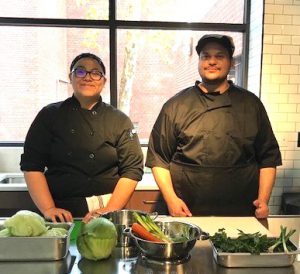 Cook around the world with Jenny Duong and Alex Colon, two undergraduate students who run the Field & Fork Global Kitchen Series! These cultural cooking classes highlight the unique flavors of regional cuisines while introducing students to essential cooking techniques. Jenny is a sophomore food science major and Alex is a junior dietetics major in the Food Science and Human Nutrition department. Read on to learn more about these exciting cooking classes, discover their paths to UF, and find out about their favorite foods of all time!
Cook around the world with Jenny Duong and Alex Colon, two undergraduate students who run the Field & Fork Global Kitchen Series! These cultural cooking classes highlight the unique flavors of regional cuisines while introducing students to essential cooking techniques. Jenny is a sophomore food science major and Alex is a junior dietetics major in the Food Science and Human Nutrition department. Read on to learn more about these exciting cooking classes, discover their paths to UF, and find out about their favorite foods of all time!
Tell me about the Field & Fork Global Kitchen Series. How did the program come about and what kinds of classes do you lead? What do you wish to achieve with these classes?

Alex: The Field & Fork Global Kitchen Series is a collaboration between the Field & Fork Farm and the Food Science and Human Nutrition department, and it gives students an opportunity to learn about different cultural cuisines in a fun, hands-on setting. Students are divided into small groups of 2-3 and given two recipes to prepare. Half of the class makes one set of recipes, and the other class makes another set of recipes. At the end of the class, once all the food is prepared, the students come together to share their food and try a little bit of everything.
The primary goals of these cooking classes were to provide education about cooking through recipes from culturally diverse cuisines, highlight fresh, seasonal produce from the Field & Fork Farm, and provide students with some basic nutrition education relevant to the cultures we selected. We also focus on making the recipes’ cost-per-serving affordable to college students. In addition, the recipes can be made in your typical college dorm. No fancy tools!
The program was created by our wonderful directors, Dr. Jeanette Andrade, and Anna Prizzia. We are lucky to have been chosen from all of the applicants for this position, and we are thankful for the opportunity. It’s been a very rewarding experience to see students improving their cooking skills in such a short period of time.
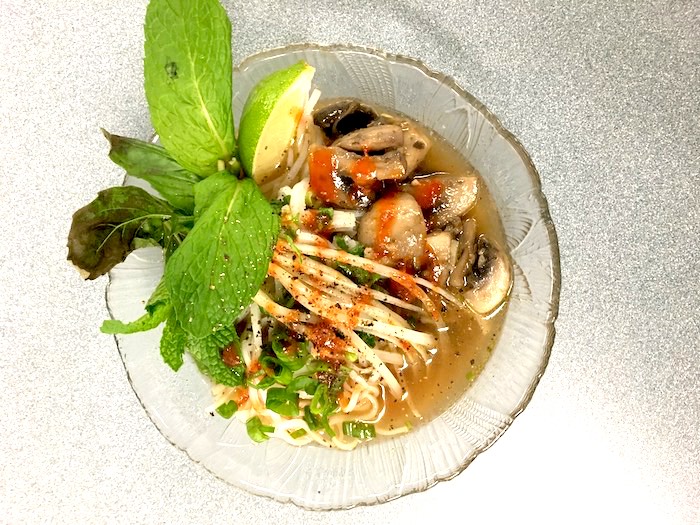
Jenny: Each month, we focus on a different culture. During our first class, we created Vietnamese dishes. In the next three months, we will cook cuisine from India, Morocco, and Mexico. We wish to educate the student community and give them the skills to cook at home confidently! Many students are turned off to the idea of cooking, thinking they must be trained in the arts to cook a great tasting meal, but that’s not true. With basic kitchen skills, we want to encourage our students to create nutritionally balanced and robust meals for a lower price than takeout.
It’s clear you have a passion for your work! Would you share how you chose food science (Jenny) and dietetics (Alex) as your majors?
Jenny: I chose food science after I got accepted into this Kitchen Series internship in the FSHN department! Previously, I was a health science major on a premed track to become an orthopedic doctor. I worked in a restaurant back home for 3.5 years and loved cooking, so after I applied for this job, I realized that medicine was not my passion. I knew I had always loved cooking for as long as I could remember, so a month into the internship I decided to switch into my true passion!
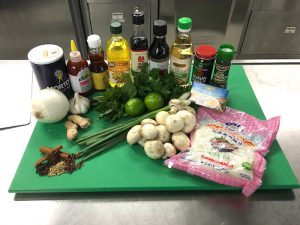
Alex: I chose dietetics as my major because it seemed like a natural progression from where I was in my life. I attended culinary school in Orlando, Florida at Valencia College. There, I received my associate’s degree in Baking & Pastry Arts Management, as well as several certificates in Culinary Arts Management.
Food is such a universal language. Each region may have its own unique cuisine, but at the end of the day we all share a need for food and the comfort it brings. Nutrition and food are so closely related. I saw dietetics as the next step towards truly understanding and finding a career that focuses on that special relationship shared by all people–food.
I understand you both have experience in the culinary world. What did you each do?

Alex: I went to culinary school, and I also worked in a bakery that has been featured on Food Network several times, Se7en Bites. There, I was a baker, and occasionally worked as a prep cook for weekend brunch service. I enjoyed waking up every morning and making several hundred fresh buttermilk biscuits. It was strangely relaxing.
Jenny: In high school, I completed a culinary program and earned my certification in SafeStaff and ServSafe. These two certificates authorized me to work in any food establishment. I also worked at a restaurant back in my hometown, Santana Pizza, for about 3.5 years. Not only did I learn techniques from my high school culinary instructor, Leo Renzette, but I also picked up quick restaurant tips and tricks by working alongside my executive chef, Matthew Branche.
What do you want to do after graduation?
Jenny: After graduation, I would love to fulfill my dream of becoming a menu developer. A menu developer is hired by restaurant owners to create its cuisine, making sure it is nutritionally balanced with a robust flavor profile. Using a combination of my food science knowledge and culinary skills, I would create complex flavor profiles for these restaurants.
Alex: I will likely pursue a master’s degree and go on to take my registered dietitian exam so that I can become an RD. My career goals include working as a dietitian in a foodservice or community nutrition setting while saving up for my dream business. I would like to open a cooking school that focuses on teaching individuals with medical conditions, such as diabetes, how to prepare food that is nutritionally balanced to meet their specific needs.
What do you like to do in your free time?
Alex: It’s cliché, but I’m always cooking. I love trying new recipes and seeing how I can make things taste better while also making them better for me nutritionally. Lately I’m really big on meal-prepping to keep up with my busy schedule!

Jenny: In my free time, I enjoy cooking, ironically enough. As a college student, I know firsthand that it is always go, go, go. Between my school load and workload, I often do not have time to cook a nice meal for myself, so I buy something quick and head off to the library or class. So, when I get any free time, I like cooking new dishes. Recently, I have attempted two new recipes/techniques: lollipop chicken drumsticks and homemade cornbread with 10-hour sous vide ribs!
What was your favorite food growing up, and what is your favorite food now?
Jenny: Growing up, I loved any type of noodle. In a Vietnamese household, noodles and rice are a staple in almost every dish. Whether we had instant noodles or a homemade bowl of beef pho, I remember lighting up every time I opened the front door and the aromas hit my nose! My grandma’s pho is all time favorite food–who doesn’t love grandmas cooking? Honestly, I do not think I have a favorite food now. Though it sounds cliché, I love almost everything. As a chef, I believe it’s important to try everything when you get the chance.
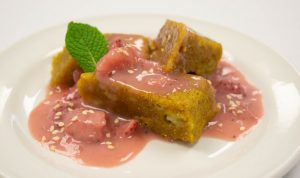
Alex: Growing up, my favorite food would have to be my family’s recipe for chocolate buttermilk cake. Any time we had a celebration, you could bet someone would make it. Today my favorite food is a tie between fried green tomatoes and Rainier cherries, the latter of which have a very small window of the year where they are at their peak freshness.
Anything else to add?
Alex: The Field & Fork Global Kitchen Series has been a wonderful experience, and I am so grateful for the opportunity. It aligns so well with my career goals, and I almost couldn’t believe it when I initially heard about the position. In such a short amount of time we’ve been able to connect with so many students from different backgrounds and skill levels, as both instructors and peers. It’s been wonderful running into students around campus who remember me from the cooking class and are actively looking forward to and excited about the next one.
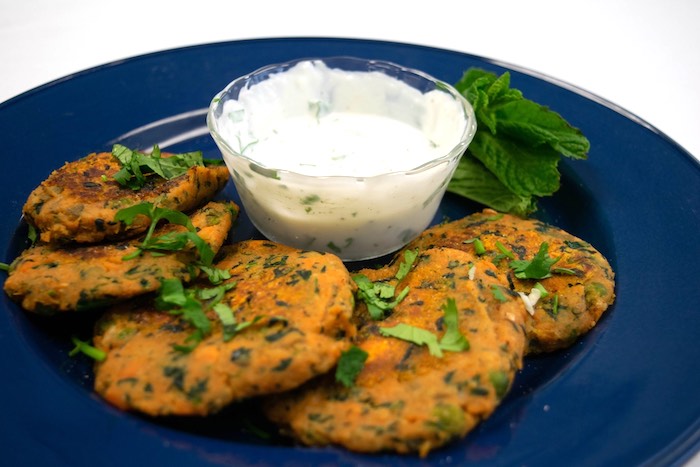
Click here for the Hara Bhara Kabab recipe!
Want to know more about food science and dietetics and how to become a food scientist or registered dietitian? Learn more here and here!
P.S. Want to read more about the amazing work going on in the FSHN department? See our previous student and faculty profiles below:
Undergraduate Students:
Shannon Mai, Dietetics
Graduate Students:
Savanna Curtis, Food Science
Carley Rusch and Matthew Beke, Nutritional Sciences
Faculty:
Dr. Naim Montazeri, Food Virology
Dr. Jeanette Andrade, Dietetics
 0
0
